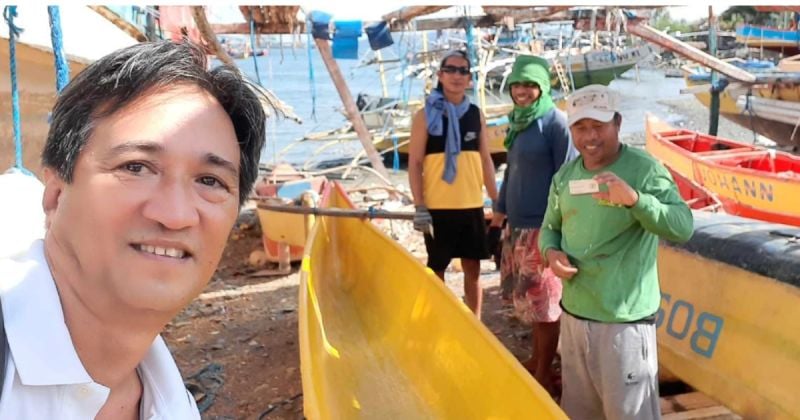Modernizing the Banca: UP CIDS to Pilot Test a Hybrid Engine for Small Marine Vessels

Assistant Professor Paul Rodgers (left) with local boatbuilders and fishermen next to a fiberglass banca in Sisiman, Mariveles, Bataan.
In response to the urgent need for green and clean energy use in the maritime industry, the Political Economy Program (PEP) of the UP Center for Integrative and Development Studies (UP CIDS) has launched a project to retrofit small marine vessels with hybrid engines. This initiative aims to modernize the Filipino banca (small boats) for long distance travel while reducing carbon emissions.
For PEP, this innovation is long overdue. Municipal fishing vessels comprise the majority of the country’s fleet, yet they are often overlooked in discussions about green energy transitions.
Spearheaded by Naval Architect and Asst. Prof. Paul Rodgers of the UP Department of Mechanical Engineering (UPDME), the study explores the development of gasoline-electric engines as a practical and cost-effective option for small fishers and small boat operators.
The design involves retrofitting existing bancas with a hybrid propulsion system that integrates an electric motor, a battery energy storage, and solar panels alongside a gasoline-driven engine.
“Retrofitting offers the benefits of extended range, reduced fuel consumption, and lower greenhouse gas (GHG) emissions,” Rodgers stated.
PEP launched the project with Rodgers in 2021 and organized a roundtable discussion with key stakeholders to present his blueprint of the hybrid engine to government agencies (notably, the Department of Transportation and the Maritime Industry Authority), UP Research and Development (R&D) community members, international organizations such as the International Maritime Organization, and industry actors.
In 2022, UP CIDS published the project’s policy brief, entitled “Retrofitting Small Marine Vessels for Range Extension and Emissions Reduction.”
In the first half of 2024, Rodgers concluded his field work in the coastal cities of Navotas in Rizal province and Mariveles, Bataan, where he found that traditional bancas have the space to accommodate the retrofit and that small shipbuilders and fisherfolk are interested in the new technology.
Today, the study is set to develop and test a prototype of the hybrid engine, taking off from the blueprint and informed by field research, in order to ensure the technical and economic feasibility of the proposed retrofit.
As such, the PEP will be seeking external partners to help bring the hybrid technology to the market. It also hopes to gain government support, in the form of policies, programs, and incentives, which is crucial to encourage the adoption of these hybrid technologies by small fishers and boat operators.
PEP believes that empowering municipal fishers with access to innovative and sustainable technologies will boost the resilience and sustainability of the Philippines’ maritime and fisheries industries for years to come.
To learn more about the study, you may also contact:
Paul Rodgers
Assistant Professor
UP Department of Mechanical Engineering
[email protected]
The Political Economy Program (PEP) is one of the Research Programs of the UP Center for Integrative and Development Studies, the University of the Philippines’ policy research unit. Learn more and download FREE policy papers from PEP.